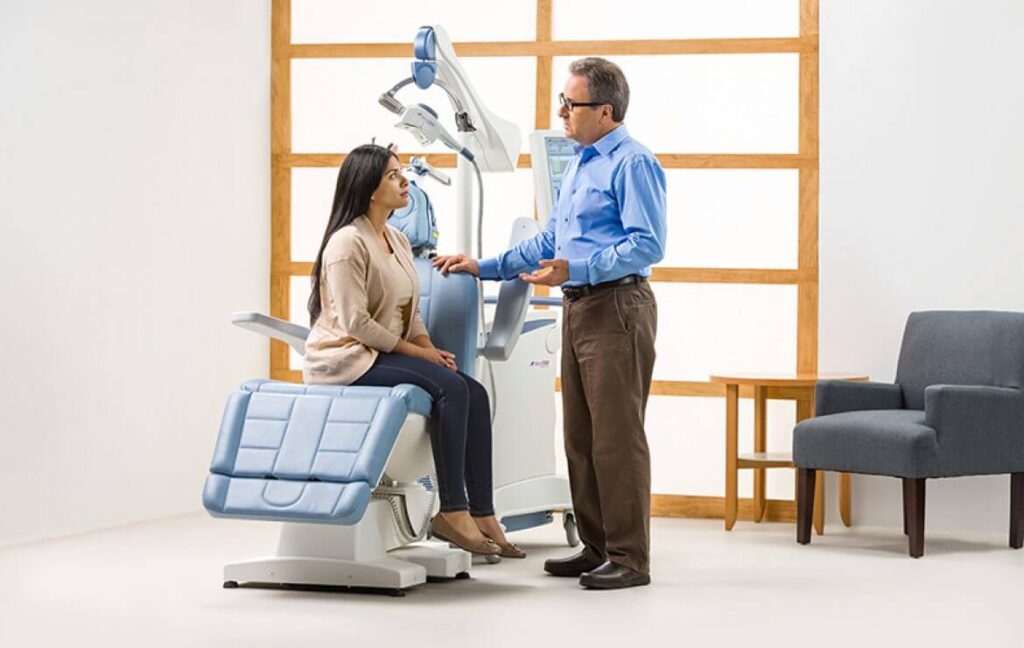[vc_row][vc_column][vc_column_text]
As we’ve talked about on the blog before, there are many more treatments available for mental health than people probably realize. Traditional talk therapy is, of course, a great option, but there are also lesser-known options like medications, ketamine treatment, ECT (Electroconvulsive therapy), and Deep TMS.
Deep TMS is an FDA approved treatment for depression, PTSD, and obsessive-compulsive disorders. It’s also been shown to be effective in treating bipolar disorder. There are two types of TMS: Deep TMS and Standard TMS. Both types use magnetic pulses to stimulate certain areas of the brain. Wondering why? The theory is that certain mental illnesses come from overactive or underactive areas of neurons in our brain structures. If we can manipulate the activity of the neurons in these parts of the brain, we can treat issues like depression and obsessive-compulsive disorder, even when they’ve resisted treatment in the past. Deep TMS is a treatment that allows us to manipulate the activity of the neurons in the brain, which makes Deep TMS a particularly helpful treatment for folks with treatment-resistant depression.
This year has been an unprecedented one, and as a result, we are in a mental health crisis. The stresses of a global pandemic, job loss, distance from loved ones, political uncertainty, and loneliness, among other things, have left many folks dealing with depression.
Depression is the most common mental illness in the US, and it has been even before COVID-19. Researchers from the National Institute of Mental Health estimate that about 17.3 million adults (7.1% of Americans) experienced a depressive episode in 2017. The stigma surrounding mental health disorders and treatment is still strong in our country, so many people who experience depression either don’t get treatment or aren’t able to access treatment. If you are able to access treatment, you may have to go through some trial and error to find what works best for you and your particular situation. However, it’s good to know that you have options for treatment and that your list of options is only growing as science helps us fill in more blanks. If you’re interested in Deep TMS treatment for depression, here are some signs to look for that it’s right for you.
You have treatment-resistant depression, PTSD, or OCD
As we mentioned above, Deep TMS is particularly helpful to folks who have had no luck with other types of treatments. While depression is a mostly manageable condition, not everyone responds to medication and therapy in the same way. Some people try to find relief for years before trying a different type of treatment. Treatments like Deep TMS give people options where before they had none.
You would like to use insurance to pay for it
Unlike some other treatments for severe treatment-resistant depression, Deep TMS is FDA approved. The FDA has approved Deep TMS to treat depression, PTSD, and obsessive-compulsive disorders. Treatments that are FDA approved are usually covered by insurance, so if you’re looking for a treatment where you can use your health insurance, Deep TMS may be a good choice.
You don’t want to use medications
There isn’t anything wrong with taking medications, but some people prefer not to or have reasons why medication isn’t an option. Deep TMS isn’t a medication. Remember, the way it works is by manipulating the neurons in your brain via an electromagnetic coil inside a helmet that you wear during treatment. The coil stimulates your brain using magnets. The treatment itself lasts about 20 minutes, but best results are seen when patients return for repetitive sessions.
You don’t have to remember to take it every day
Related to the previous point, Deep TMS might be an easier treatment for you to manage – you don’t have to take a pill every day or keep a standing appointment every week. While people see the best results from Deep TMS when they return for follow ups, the entire process is much less involved than going to a therapy appointment every week or taking a daily pill. No worrying about refills!
Deep TMS can be a life changing treatment for folks with treatment-resistant depression, PTSD, or obsessive compuslive disorders. If you’re interested in learning more about Deep TMS, our clinicians can help support you.
[/vc_column_text][/vc_column][/vc_row][vc_row][vc_column][/vc_column][/vc_row]

